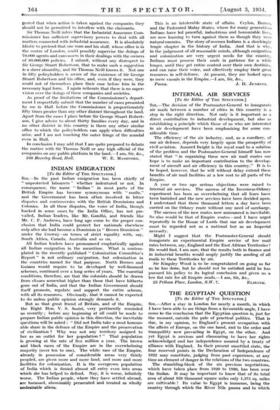INDIAN EMIGRATION
[To the Editor of THE SPECTATOR.]
SIR,—In the past Indian emigration has been chiefly of " unprotected labourers" whether indentured or not. In consequence, the name " Indian " in most parts of the British Empire has become synonymous with "coolie," and the Government has been often involved in bitter disputes and controversies with the British Dominions and
.Colonies. In all these disputes, the voice of India, though backed in some cases by the India Office, has not pre- vailed. Indian leaders, like Mr. Gandhi, and friends like Mr. C. F. Andrews, have long ago come to the proper con- clusion that India could protect her nationals elsewhere only after she had become a Dominion (a "Brown Dominion" under the Crown)—on terms of strict equality with, say, South Africa, Canada, Australia and so on.
All Indian leaders have pronounced emphatically against all Indian emigration in the meantime. What is contem- plated in the recently published "Colonization Committee's Report" is not ordinary emigration, but colonization in the countries named for that purpose. North Borneo and Guiana would require to be developed by well-financed schemes, continued over a long series of years. The essential conditions, therefore, are that the colonists should be drawn from cki3ses somewhat higher than those that have hitherto gone out of India, and that the Indian Government should itself promote, regulate and support the entire scheme, with all its resources. Obviously, that it cannot be expected to do unless public opinion strongly demands it.
But as that great friend of Britain, and of the Empire, the Right Hon. V. S. Sastri, very pertinently reminded us recently ; before any beginning at all could be made to prepare Indian public opinion in this direction, the inevitable questions will be asked : "Did not India take a most honour- able share in the defence of the Empire and the preservation of civilization ? Why was not any territory assigned to her as an outlet for her population?" That population is growing at the rate of five million a year. The brown and black races of the Empire are in the overwhelming majority (over ten to one). The white race of the Empire, already in possession of considerable areas very thinly peopled, are given more and more land, and more and more facilities for colonization. It is the overgrown population of India which is denied almost all entry even into areas which she has helped to defend. Nay, it is worse, infinitely worse. The Indian people, where they have settled abroad, are harassed, abominably persecuted and treated as wholly undesirable aliens.
This is an intolerable state of affairs. Ceylon, Burma, and the Federated Malay States, where for many generations Indians have led peaceful, industrious and honourable lives, are now learning to turn against them as though they were natural enemies. The story of °verses Indians is a shockingly tragic chapter in the history of India. And that is why, in the judgement of all reasonable minds, although emigration and colonization are very urgent needs for the country, Indians must possess their souls in patience for a while longer, until they get entire control over their own destinies, and can raise their voice, and effectively employ their great resources in self-defence. At present, they are looked WOO as mere vassals in the Empire.—I am, Sir, &c.,






























 Previous page
Previous page